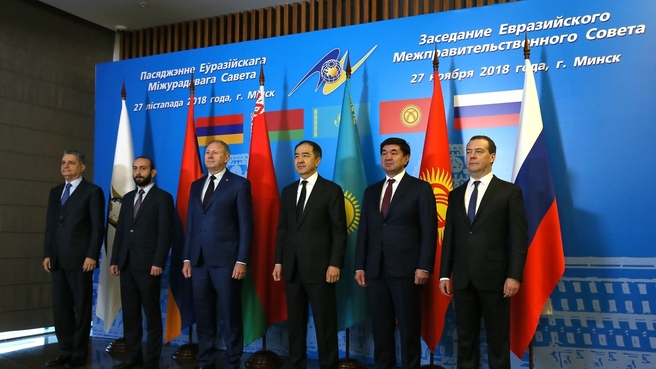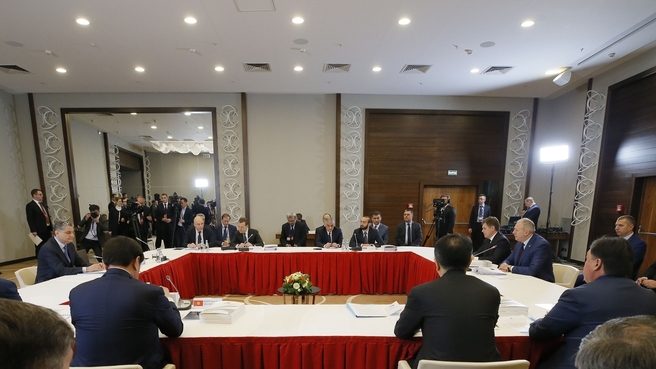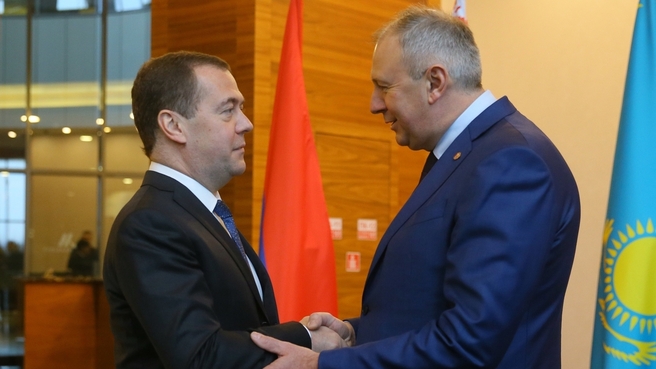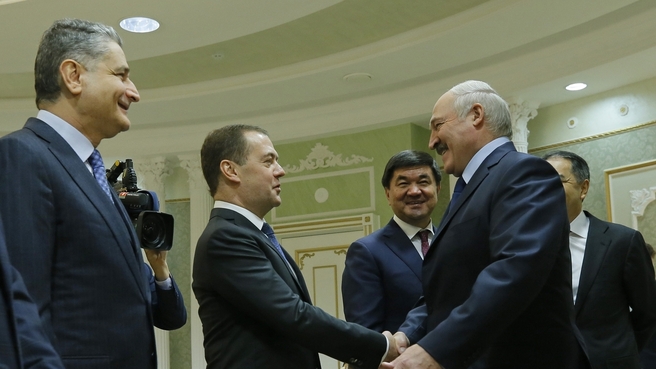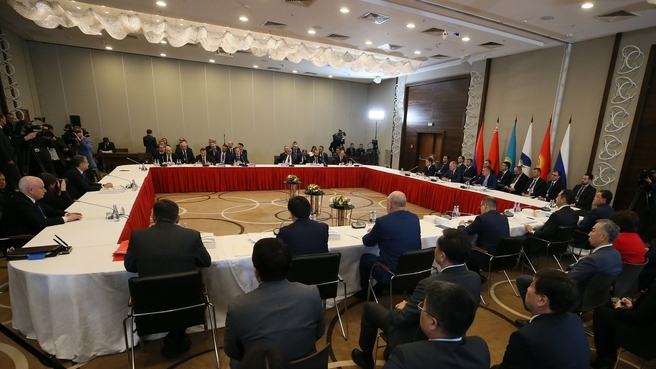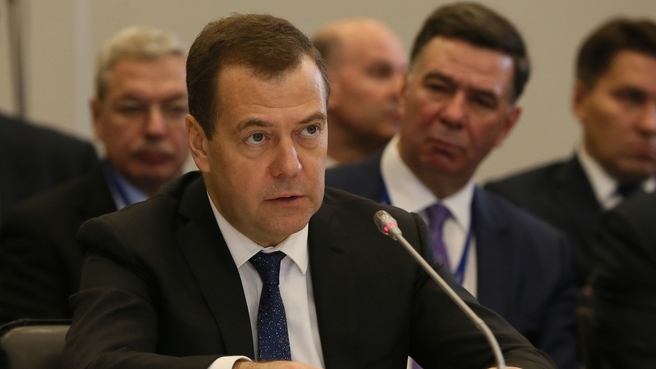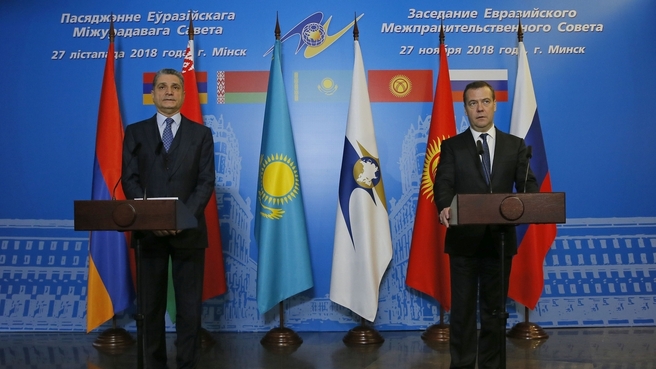Dmitry Medvedev: "In the first nine months of this year, trade within the EAEU grew by approximately 13.5–14 percent. As much as 90 percent of our deliveries were produced in the member states. Overall, the volume of our foreign trade has increased by 22 percent, mostly thanks to our exports, which exceeded the volume of imported goods."
Dmitry Medvedev’s remarks at a meeting of the Eurasian Intergovernmental Council
Documents signed following the meeting
List of delegation heads attending the meeting of the Eurasian Intergovernmental Council:
Delegation heads of the Eurasian Intergovernmental Council pose for a joint photograph
Acting Prime Minister of the Republic of Armenia Ararat Mirzoyan
Prime Minister of the Republic of Belarus Sergei Roumas
Prime Minister of the Republic of Kazakhstan Bakytzhan Sagintayev
Prime Minister of the Kyrgyz Republic Mukhammedkalyi Abylgaziyev
Prime Minister of the Russian Federation Dmitry Medvedev
Chairman of the Board of the Eurasian Economic Commission Tigran Sargsyan
Dmitry Medvedev’s remarks at a meeting of the Eurasian Intergovernmental Council
Colleagues, Mr Roumas,
Speaking on behalf of Russia’s chairmanship in the Eurasian Intergovernmental Council, I would like to welcome all of you to this expanded format meeting and to thank our Belarusian partners for organising this meeting.
Russia is chairing the Eurasian Intergovernmental Council this year. Overall, we have a positive view on the pace of our economic integration. We are making progress in all spheres. The common market of the Eurasian Economic Union (EAEU) is developing, even if not without difficulties. In the first nine months of this year, trade within the EAEU grew by approximately 13.5–14 percent. As much as 90 percent of our deliveries were produced in the member states. Overall, the volume of our foreign trade has increased by 22 percent, mostly thanks to our exports, which exceeded the volume of imported goods.
All five member states have strengthened their positions in trade, both within the EAEU and in international markets. This does not mean that we can now sit on our hands. We discussed very complicated, delicate and legally complex issues at our restricted format meeting, and I believe that it was a good discussion. But we will continue doing this because a number of issues merit further discussion.
I would like to say a few words about the main areas of our common work.
First, we must strengthen the internal contour of our integration and promote the development of supranational regulatory bodies. I am referring to the roadmap on removing obstacles on the internal EAEU market. We discussed this issue today at a meeting with President of Belarus Alexander Lukashenko and also here, at our meeting. We must ensure the timely implementation of this roadmap. There are some problems. We are lagging behind on some issues, which is what we must focus on.
This year we have taken a big step towards creating a common financial market. I am referring to the agreement we have signed to streamline our financial legislation. It is important to create common markets for crude oil, petroleum products and gas, as well as competitive conditions for the work of our businesses in this sphere. The implementation of our tax plans and budgets, the protection of consumer rights and fair competition depend on the transparent movement of commodities across the EAEU.
We signed the Agreement on the Marking of Goods with Identification Means in Almaty in February this year. It will help us also apply this mechanism to other groups of commodities, fight grey schemes and improve the market situation.
The ratification process for this agreement is ongoing. All of us hope it will be completed this year and we will have a truly effective document.
Second, we have joined forces in the development of promising integration spheres, primarily the digital economy. We have created the legal and institutional frameworks and selected several projects. Two more are under discussion. All the member states are working seriously in the digital sphere and have submitted their projects. This is a prerequisite for our further development in this field. We will issue instructions to the commission to work jointly with the governments to draft a concept for applying special regimes.
We must also continue developing the import substitution sphere. We see increasing protectionism in many countries and markets, where international trade rules are being neglected increasingly more flagrantly. In this context, the EAEU must set a high standard for trade cooperation and integration.
We are also doing well in the sphere of international cooperation. This year we signed a free trade agreement with Iran and an agreement on trade and economic cooperation with China. All the necessary procedures concerning these agreements should be completed in the near future. I hope that this will create additional advantages for our economies. At the same time, we should continue talks with our other partners, both individual states such as Singapore, Serbia, Israel, Egypt and India and integration associations, including China’s well-known initiative and several other projects.
We have held successful summit meetings on this matter. I recently updated my colleagues on the meeting I attended, the APEC Leader’s Week. We are also strengthening cooperation between the EAEU and the CIS. This year we have established the status of EAEU observer countries, which offers more opportunities for cooperation.
Documents signed following the meeting of the Eurasian Intergovernmental Council:
Directive on developing the concept for using special arrangements (“regulatory sandboxes”) as part of implementing the Union’s digital agenda;
Directive on progress in removing obstacles on the domestic market of the Eurasian Economic Union in 2017 - 2018;
Instruction on the results of executing Eurasian Intergovernmental Council Instruction No. 6 of 27 July 2018;
Directive on amending Board of the Eurasian Economic Commission Resolution No. 90 of 29 May 2018;”
Directive on the system of labelling goods with control (identification) marks;
Directive on approving the programme of activities to celebrate the 25th anniversary of the Eurasian project and the 5th anniversary of signing the Treaty on the Eurasian Economic Union in 2019;
Resolution on the Supreme Eurasian Economic Council draft resolution “The budget of the Eurasian Economic Union for 2019;”
Resolution on the Supreme Eurasian Economic Council resolutions “The report on budget performance of the Eurasian Economic Union for 2017;”
Directive on auditing the financial and economic activities of the Court of the Eurasian Economic Union and the Eurasian Economic Commission;”
Directive on joint forecasts for the development of the agro-industrial complex, the balance of supply and demand of the member states of the Eurasian Economic Union for agricultural products, food, flax fibre, raw hides, cotton fiber and wool for 2018-2019;
Directive on the action plan to promote the production and use of wheeled vehicles with electric engines in the member states of the Eurasian Economic Union for 2018-2020;
Resolution on amending Eurasian Intergovernmental Council Resolution No. 9 of 8 September 2015;
Directive on presenting a candidate for member of the Council of the Eurasian Economic Commission to the Supreme Eurasian Economic Council;
Directive on the time and place of the next meeting of the Eurasian Intergovernmental Council.
